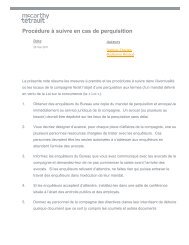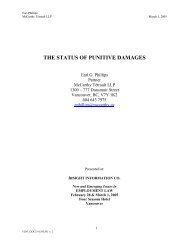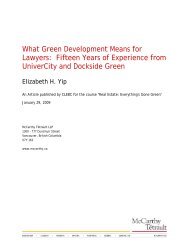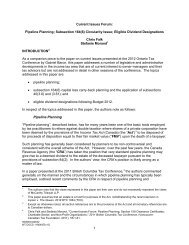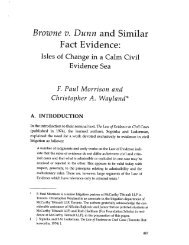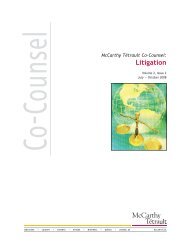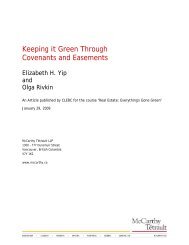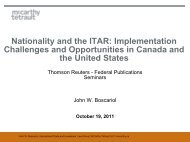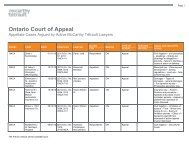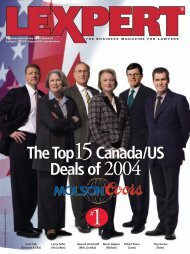The Doctrine of Public Policy in Canadian Contract Law
The Doctrine of Public Policy in Canadian Contract Law
The Doctrine of Public Policy in Canadian Contract Law
Create successful ePaper yourself
Turn your PDF publications into a flip-book with our unique Google optimized e-Paper software.
36 I Annual Review <strong>of</strong> Civil Litigation<br />
actually applied the notional severance remedy <strong>in</strong> order to preserve the validity<br />
<strong>of</strong> an employee restrictive covenant which was deemed overly broad by reason<br />
<strong>of</strong> its application to the "Metropolitan City <strong>of</strong> Vancouver."' 92 In light <strong>of</strong> ACSand<br />
KRG, there is now a legitimate argument that the Transport spectrum approach<br />
to the consequences <strong>of</strong> statutory illegality applies to all contracts which are<br />
presumptively void for hav<strong>in</strong>g contravened public policy.193<br />
Where a court f<strong>in</strong>ds that a contract is unenforceable <strong>in</strong> its entirety, a party<br />
who has transferred benefits under the agreement has traditionally been required<br />
to establish an exception to the ex turpi causa doctr<strong>in</strong>e <strong>in</strong> order to obta<strong>in</strong><br />
restitution. Such exceptions <strong>in</strong>clude:<br />
.(1) where the party claim<strong>in</strong>g for return <strong>of</strong> property is less at fault; (2) where<br />
the claimant 'repents' before the illegal contract is performed; and (3) where the<br />
claimant has an <strong>in</strong>dependent right to recover (for example, a situation where<br />
recovery <strong>in</strong> tort might be possible despite an illegal contract).<br />
194<br />
192 At paras. 57-62 <strong>of</strong> KRG, Chiasson J.A. stated that "[i]n this case, the real difficulty arises<br />
from the parties' agreement to the geographic reach <strong>of</strong> the restrictive covenant as the<br />
`Metropolitan City <strong>of</strong> Vancouver'. To strike the word 'metropolitan' would not reflect<br />
the obvious <strong>in</strong>tention <strong>of</strong> the parties. <strong>The</strong>y clearly <strong>in</strong>tended a geographic reach that<br />
<strong>in</strong>cluded the City <strong>of</strong> Vancouver and someth<strong>in</strong>g more. <strong>The</strong> 'blue pencil' approach would<br />
distort that <strong>in</strong>tention.. . <strong>The</strong>re is no fixed, recognized mean<strong>in</strong>g for the phrase 'Metropolitan<br />
City <strong>of</strong> Vancouver'. <strong>The</strong> task at hand is to construe that word to attempt to<br />
give effect to the <strong>in</strong>tentions <strong>of</strong> the parties and, if necessary, to proceed by way <strong>of</strong> notional<br />
severance. .. <strong>in</strong> view <strong>of</strong> the clear direction <strong>of</strong> the Supreme Court <strong>of</strong> Canada that it is<br />
permissible to use notional severance to attempt to give effect to the substance <strong>of</strong> an<br />
agreement and to avoid hav<strong>in</strong>g that substance subverted by an unfortunate choice <strong>of</strong><br />
language, 1 would construe 'Metropolitan City <strong>of</strong> Vancouver' to prevent Mr. Shafron<br />
from compet<strong>in</strong>g <strong>in</strong> the City <strong>of</strong> Vancouver and municipalities directly contiguous to it.<br />
Geographically, I would <strong>in</strong>clude the City <strong>of</strong> Vancouver, the University <strong>of</strong> British Columbia<br />
Endowment Lands, Richmond and Burnaby. . . By read<strong>in</strong>g down the phrase<br />
`Metropolitan City <strong>of</strong> Vancouver' to an area consistent with the need to protect KRG<br />
Western's bus<strong>in</strong>ess, an area that likely was <strong>in</strong> the reasonable contemplation <strong>of</strong> the parties<br />
when they made their agreement, the substance <strong>of</strong> their barga<strong>in</strong> is respected and enforced".<br />
193 This approach appears to have some academic support, at least with respect to contracts<br />
<strong>in</strong> restra<strong>in</strong>t <strong>of</strong> trade: see Jacob S. Ziegel, "Is Notional Severance the Right Solution for<br />
Section 347's Ills" (2005) 42 Can. Bus. L. J. 282 at 287-288. A flexible approach to the<br />
consequences <strong>of</strong> public policy violations may also be found <strong>in</strong> s. 178 <strong>of</strong> the Restatement<br />
<strong>of</strong> the <strong>Law</strong>, Second, <strong>Contract</strong>s (St. Paul, M<strong>in</strong>n.: American <strong>Law</strong> Institute, 1981), and ss.<br />
7 and 8 <strong>of</strong> the New Zealand Illegal <strong>Contract</strong>s Act, 1970 (N.Z.), 1970/129.<br />
194 Still v. M<strong>in</strong>ister <strong>of</strong> National Revenue (1997), [19981 1 P.C. 549, [1997] F.C.J. No. 1622<br />
(C.A.) at para. 24. <strong>The</strong>re are additional exceptions to the ex turpi causa rule, <strong>in</strong>clud<strong>in</strong>g:<br />
(a) where the contract is made illegal by statute <strong>in</strong> the <strong>in</strong>terests <strong>of</strong> a class <strong>of</strong> persons<br />
which <strong>in</strong>cludes the pla<strong>in</strong>tiff; (b) where the pla<strong>in</strong>tiff was <strong>in</strong>duced to enter <strong>in</strong>to the contract<br />
by fraud or duress; and (c) mistake: see Lapo<strong>in</strong>te v. Messier (1914), 49 S.C.R. 271, 1914<br />
CarswellQue 5 at paras. 48-50; and Vandekerhove v. Litchfield (1993), 84 B.C.L.R. (2d)<br />
252, [1993] B.C.J. No. 1355 (S.C.), reversed on other grounds (1995), 1 B.C.L.R. (3d)<br />
70 (C.A.), leave to appeal refused (1995), 126 D.L.R. (4th) vii (note), [1995] S.C.C.A.<br />
No. 131 (S.C.C.) at para. 59 [QL].



